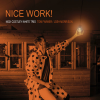Home » Jazz Articles » Album Review » Jim Rattigan: Duos
Jim Rattigan: Duos
The aim of Duos is to reveal the full range of the capabilities of the French horn in an intimate jazz setting. This box-set of three albums features Rattigan in a duo format with three different collaborators. The albums are: Dialogues with pianist Ivo Neame, You Must Believe In Spring with guitarist Nick Costley-White and Thelonious Monk with pianist Hans Koller. Featuring standards and original compositions, each album has a distinct atmosphere and feel; it is a testament to Rattigan's skill that they all sound so different.
Dialogues is improvisational in nature, Rattigan and Neame explore their own material as well as standards. Rattigan is able to move his tonal range from trumpet-like to trombone-like and it should be remembered that the French horn was originally a hunting horn. Neame's arrangement of Wayne Shorter's "Infant Eyes" is filled with longing and is highly engaging, blending the recognisable with subtle new twists. The same applies to his striking arrangement of Billy Strayhorn's "Chelsea Bridge." Rattigan's "A Hero's Path," is a stand-out with an improvised dialogue over a 16-bar piano tune, each musician responding to the invention of the other with sensitivity and precision. Often used as a recital piece exploring the lyrical side of the horn, Alexander Glazunov's "Reverie," is reworked into a romantic jazz ballad. This album has the most classical underpinnings of the three and is an engaging mix of the virtuosic and the introspective.
There is a totally different feel to You Must Believe In Spring. It is completely relaxed, as though Rattigan had suggested to Costley-White that they meet up in the back room of the local pub and play a few tracks together. Albeit a back room with tremendous acoustics. The results are tender and intimate; they explore a range of standards ranging from a gentle "Ligia" by Antonio Carlos Jobim to an enigmatic "Lush Life" by Billy Strayhorn. "My Funny Valentine" is neatly adapted for the horn, with Rattigan's control keeping the horn closer to the range of the trumpet. Earl Zandars' "How My Heart Sings" is beautifully played allowing the horn to gently swing and Costley-White's solo is delicately judged. Costley-White is a skilful foil for the horn throughout. Melding his guitar around the melodies, playing with flair and imagination, especially notable on Steve Swallow's "Falling Grace" and Arthur Schwartz's "Alone Together."
As might be surmised from the title, the third album of the project is entirely focused on compositions by Monk. Koller has extensive knowledge of Monk's tunes and along with Rattigan they set about investigating the complete catalogue before curating a list of ten songs to work with. They include a plaintive version of the well-known "'Round Midnight"; Rattigan's delivery is breathy and at the trumpet end of the range of the horn. Koller's piano entwines around the horn in an arrangement which just works. The old-time blues of "Blue Monk," is given a lyrical New Orleans style swing which is fun and joyous. The normally melancholic "Ask Me Now" is given a more light-hearted reading by Rattigan, supported by an inventive solo from Koller. Less well-known tunes are also explored with the playful "Tinkle-Tinkle" being a stand-out, with both instruments providing fast precise flurries of notes in an intricate arrangement.
This project succeeds on many levels. There must have been a challenge in adapting, arranging and re-arranging a wide variety of tunes for these duo formats, but they all appear to have had a great time doing so. Each album is distinctly different, offering a variety of stripped-back settings for the French horn to explore. In Rattigan's hand, the horn proves versatile both in tonal palette and dynamics. Seamlessly adapting to his different collaborators and finding creative sparks with all, he shows melodic flair and improvisational daring.
Track Listing
Dialogues: Reverie; Elegy; Chelsea Bridge; Ishaya; A Hero's Path; Infant Eyes; Passing Point. You Must Believe In Spring: Ligia; Very Early; Parker's Mood; My Funny Valentine; I Could Write A Book; You Must Believe in Spring; How My Heart Sings; Alone Together; Lush Life; Falling Grace; Body and Soul. Theolonius Monk: Ruby, My Dear; Pannonica; 'Round Midnight; Tinkle-Tinkle; Ugly Beauty; Blue Monk; Monk's Mood; Ask Me Now; Epistrophy (Playout).
Personnel
Additional Instrumentation
Ivo Neame: piano (Dialogues 1-7); Nick Costley-White: guitar (You Must Believe In Spring 1-11); Hans Koller: piano (Theolonius Monk 1-10).
Album information
Title: Duos | Year Released: 2023 | Record Label: Three Worlds Records
Tags
PREVIOUS / NEXT
Support All About Jazz
 All About Jazz has been a pillar of jazz since 1995, championing it as an art form and, more importantly, supporting the musicians who make it. Our enduring commitment has made "AAJ" one of the most culturally important websites of its kind, read by hundreds of thousands of fans, musicians and industry figures every month.
All About Jazz has been a pillar of jazz since 1995, championing it as an art form and, more importantly, supporting the musicians who make it. Our enduring commitment has made "AAJ" one of the most culturally important websites of its kind, read by hundreds of thousands of fans, musicians and industry figures every month.






















